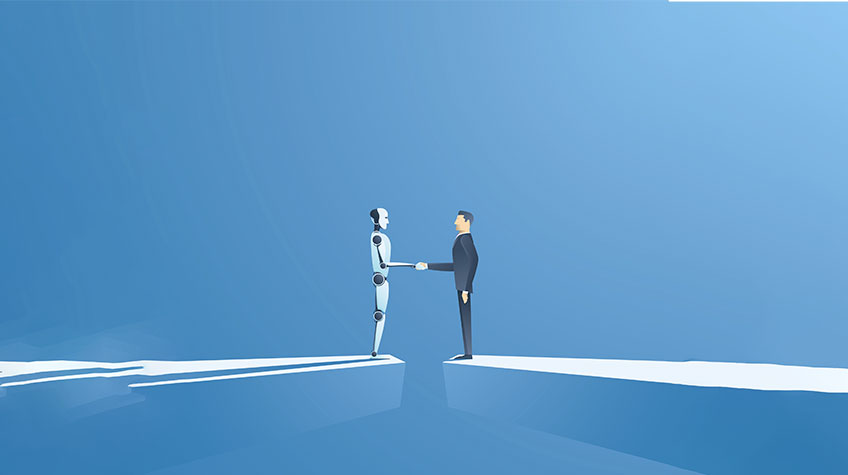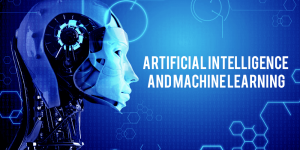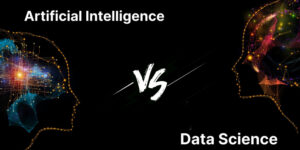
Artificial intelligence (AI) is quickly growing and changing varied areas, creating new job opportunities. These jobs range from data analysts and machine learning creators to AI-powered customer service representatives and virtual personal assistants. As AI technology evolves, it will likely create even more unique and innovative job roles. In this article, we look into what kind of jobs will AI produce.
Job Creation vs. AI
The advent of AI has led to a significant shift in the job market, with some experts predicting that it will ultimately lead to job creation, while others warn of potential job loss. On the one hand, implementing AI in various industries can lead to increased efficiency and productivity, which can create new jobs. For example, the increasing use of AI in healthcare has led to new roles, such as data analysts, who can help make sense of the vast amounts of data generated by medical systems.
On the other hand, the increasing automation of tasks previously performed by humans can lead to job loss.
For instance, with the evolution of self-driving automobiles, jobs such as taxi and truck drivers may become obsolete. Additionally, AI-powered chatbots and virtual assistants may replace customer service representatives.
Yet, it is important to mention that AI can augment human work and create new jobs rather than replace them. For example, AI can help doctors to analyze medical images more quickly and accurately, freeing up their time to focus on complex cases and patient care. Similarly, AI-powered tools can help to automate repetitive and time-consuming tasks, allowing employees to focus on more high-value work.
Overall, while AI may lead to some job loss in specific industries, it also has the potential to create new job opportunities in others. Therefore, workers and businesses need to stay informed about the latest developments in AI to adapt and take advantage of new opportunities as they arise. According to the world economic forum data, AI will create more than 97 million jobs by 2025.
Here are some of the job opportunities that AI will create
1. Data scientist
Data scientist jobs in AI are some of the most in-demand positions in the industry today. These professionals play a vital role in driving the development and implementation of AI systems by analyzing and interpreting large amounts of data. In addition, they use their expertise in machine learning, statistics, and programming to design and build models that can comprehend data and make projections or judgments.

One example of a data scientist job in AI is that of a Machine Learning Engineer. These engineers are responsible for designing and building models that can learn from data and make predictions. They use various techniques, such as supervised, unsupervised, and reinforcement learning to create models that can be used for tasks such as image recognition, natural language processing, and predictive analytics.
Another example of a data scientist job in AI is that of a Computer Vision Engineer. These engineers specialize in creating models that can comprehend and analyze visual material, such as photos and video recordings. They use convolutional neural networks and deep learning techniques to develop models that can be utilized for jobs like entity recognition, picture classification, and face identification.
AI data scientists also work with other teams and stakeholders, such as product managers and engineers, to understand the business requirements and ensure that the developed models meet the organization’s goals and objectives.
AI data scientist jobs are critical roles at the fore of pushing the expansion and execution of AI systems. These professionals use machine learning, statistics, and programming expertise to design and build models that can comprehend data and make projections or findings.
2. AI Engineers
AI Engineers are accountable for organizing, generating, and sustaining the technical infrastructure that supports AI systems. They play a critical part in the implementation and deployment of AI solutions. They work closely with data scientists, researchers, and other stakeholders to understand the requirements and develop AI systems that meet the organization’s needs.
One example of an AI engineer job is that of a Natural Language Processing Engineer. These engineers specialize in creating systems that can comprehend and analyze human voice communication.
Another example of an AI engineer job is that of a Reinforcement Learning Engineer. These engineers specialize in creating systems that can learn from their actions and optimize their behavior over time. They use Q-learning, SARSA, and PPO techniques to develop models that can be used for tasks such as game-playing, robotics, and decision-making.
AI engineers also work on integrating different systems and ensuring that the AI systems are running smoothly and efficiently. They also work on troubleshooting and debugging issues and implement security measures to protect the data and systems.
AI engineers are responsible for creating, establishing, and sustaining the technical infrastructure that supports AI systems. They play a crucial role in implementing and deploying AI solutions and work closely with data scientists, researchers, and other stakeholders to understand the requirements and develop AI systems that meet the organization’s needs.
3. AI product manager
Artificial Intelligence (AI) has revolutionized various industries and created new professional opportunities. One such job that has emerged due to the advancements in AI is that of an AI Product Manager.

The role of an AI Product Manager is to oversee the development and launch of AI-based products from concept to market. This requires a thorough understanding of AI technologies and their potential applications.
Key responsibilities of an AI Product Manager include:
- Identifying and researching use cases for AI in a company’s products.
- Cooperating with other departments and units to create and implement AI solutions.
- Communicating with stakeholders to gather feedback.
- Continuously monitoring and analyzing the performance of AI products.
- Keeping up-to-date with the most delinquent expansions in AI.
To succeed in this role, an AI Product Manager must have a strong knowledge of AI technologies and the ability to communicate effectively with technical and non-technical stakeholders. In addition, strong leadership, project management, and problem-solving skills are also essential. With the increasing use of AI in various industries, the demand for AI Product Managers is expected to grow.
4. Ai consultant
The rapid advancement of AI technology has led to the creation of new job opportunities, one of them being the role of an AI consultant. An AI consultant is a professional who helps organizations understand and implement AI technology to improve their operations and processes.
The primary responsibilities of an AI consultant include the following:
- Conducting research and analysis to identify areas where AI can benefit most.
- Developing and implementing AI strategies.
- Providing training and support to employees on AI-related topics.
- Ensuring that AI systems are secure and compliant with relevant regulations.
To be successful as an AI consultant, one must have a strong understanding of AI technologies and their applications, as well as knowledge of data science, machine learning, and software development. In addition, an AI consultant must possess excellent problem-solving and communication skills and the ability to work effectively with cross-functional teams.
With the increasing usage of AI in different manufacturers, the demand for AI consultants is expected to grow. As such, this job is becoming increasingly in order as more organizations are looking for AI experts to help them with their business processes, operations, and strategy.
5. AI ethics expert
As Artificial Intelligence (AI) becomes more prevalent in society, there is an increasing need for experts in AI ethics to ensure that AI systems are developed and used responsibly and ethically. An AI ethics expert specializes in understanding the ethical implications of AI technology and creating policies and guidelines to govern its use.
The main duties of an AI ethics expert include the following:
- Identifying and analyzing potential ethical issues related to the development and use of AI systems.
- Creating procedures and best practices for the accountable usage of AI.
- Researching the social and moral effects of AI.
To be successful as an AI ethics expert, one must have a strong understanding of AI technologies and their applications, as well as knowledge of philosophy, ethics, and social science. Additionally, an AI ethics expert must have outstanding communication and issue-solving accomplishments.

As AI technology advances, the importance of ethical considerations in its development and use will become more crucial. As such, the role of an AI ethics expert is becoming increasingly important to ensure that AI is utilized in a manner that helps the community and appreciates human freedoms, importance, and dignity.
6. AI operations/maintenance expert
As Artificial Intelligence (AI) systems become more prevalent in various industries, the need for AI operations and maintenance experts has emerged. An AI operations and maintenance expert is a professional responsible for the ongoing operation and maintenance of AI-based systems and applications.
The primary responsibilities of an AI operations and maintenance expert include monitoring and maintaining the performance of AI systems, troubleshooting and resolving technical issues, updating and upgrading AI systems as needed, and ensuring compliance with relevant regulations and standards.
To succeed as an AI operations and maintenance expert, one must have a strong understanding of AI technologies and knowledge of data science, machine learning, and software development. Additionally, an AI operations and maintenance expert must have excellent problem-solving and communication skills and the ability to work effectively with cross-functional teams.
As AI technology continues to evolve, the role of an AI operations and maintenance expert will become increasingly important to ensure that AI-based systems run smoothly and efficiently and that any issues are quickly and effectively resolved. This position is crucial to ensure the correct functioning, reliability, and security of AI systems in different industries and settings and to keep up with AI technology’s fast-paced and ever-changing nature.
Conclusion
AI will create jobs that involve designing, developing, and deploying AI systems and applications. These jobs range from data analysts and machine learning engineers to software developers and AI consultants.
Additionally, AI will create new job opportunities in healthcare, finance, and manufacturing industries, as these sectors increasingly adopt AI technologies to improve efficiency and decision-making. As AI advances, fresh and unique job roles will likely emerge that we cannot yet imagine. We hope this blog on what kind of jobs will AI produce is useful to the readers.






